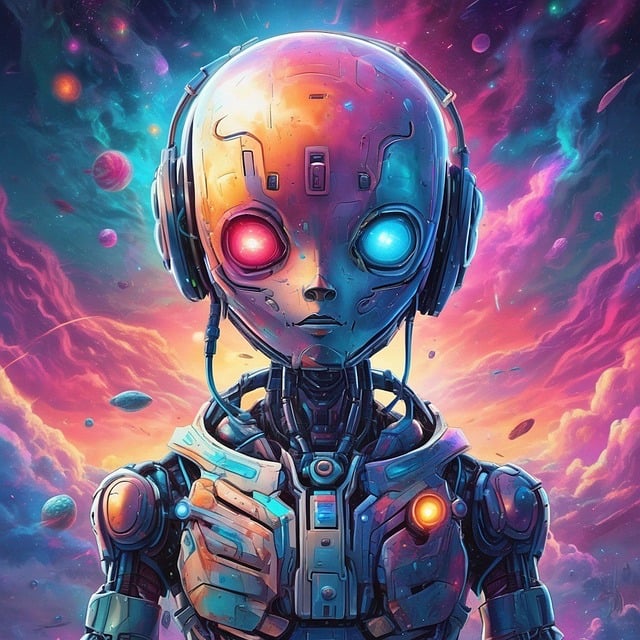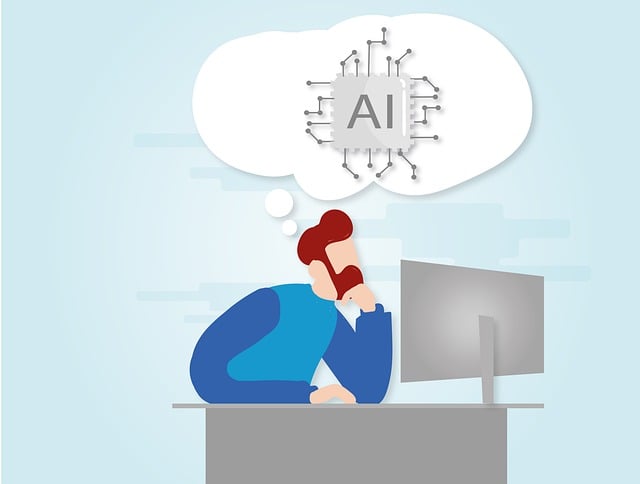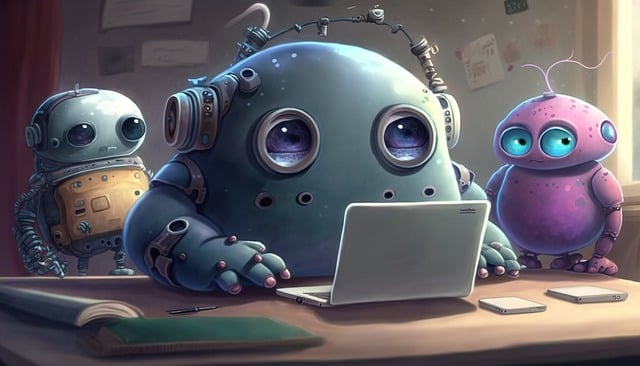Ochatbots, powered by Natural Language Processing (NLP), are advanced conversational tools that mimic human interactions. They interpret user inputs using algorithms and machine learning models, analyze context, intent, and sentiment, then generate tailored responses. Integrated into diverse platforms, these chatbots offer 24/7 support, enhancing user experiences with quick, personalized assistance. With continuous learning from feedback loops, ochatbots have evolved to serve various purposes like customer service, education (virtual tutoring), healthcare (appointment scheduling), marketing, and entertainment. Businesses benefit from round-the-clock support, personalization, and adaptability, but must address data quality, privacy, and security concerns. Future advancements in machine learning algorithms promise more human-like responses, revolutionizing business-customer engagement strategies through predictive analytics for proactive solutions.
“Discover the transformative power of Natural Language Processing (NLP) chatbots—intelligent virtual assistants that understand and respond to human language. This comprehensive guide explores the fundamentals, underlying technology, and diverse applications of these sophisticated tools. From customer service and support to personalized recommendations, NLP chatbots are revolutionizing interactions. Learn about their benefits, challenges, and future prospects as we unravel the potential of this exciting technology, focusing on optimal use cases for oChatbots.”
- Understanding NLP Chatbots: The Basics
- How Do They Work? A Step-by-Step Process
- Types of Chatbot Applications and Use Cases
- Benefits and Challenges in Implementing NLP Chatbots
- Future Trends Shaping the World of NLP Chatbots
Understanding NLP Chatbots: The Basics

NLP chatbots, or ochatbots, are revolutionary tools that harness Natural Language Processing (NLP) to facilitate human-computer conversations. They utilize complex algorithms and machine learning models to interpret user inputs, generate appropriate responses, and learn from each interaction. These chatbots can understand context, intent, and sentiment, allowing them to provide personalized and meaningful responses.
The basics of an ochatbot involve a series of steps: receiving user input through text or voice, processing this input using NLP techniques, accessing relevant information or triggering appropriate actions based on the analysis, and then generating a response that is both coherent and contextually fitting. They can be integrated into various platforms, from websites to messaging apps, offering 24/7 support and enhancing user experiences by providing quick answers to queries.
How Do They Work? A Step-by-Step Process

NLP chatbots, or ochatbots, operate through a sophisticated process that involves Natural Language Processing (NLP) and machine learning. Here’s a step-by-step breakdown:
1. User Input: The conversation begins when a user types in a message, asking a question or providing a statement. This input is processed by the chatbot’s NLP engine, which identifies keywords and the overall intent behind the message.
2. Intent Recognition: Using sophisticated algorithms, the ochatbot analyses the text to determine what the user is trying to achieve. For instance, it could be asking for information, seeking support, or attempting to make a purchase.
3. Context Understanding: Beyond just understanding individual words, the chatbot utilizes context clues from previous messages in the conversation to comprehend the user’s needs more accurately. This enables it to deliver more relevant and meaningful responses.
4. Response Generation: Based on the recognized intent and understood context, the ochatbot generates an appropriate response using pre-programmed rules or by pulling dynamic content from a database. It may also use machine learning models to craft unique replies that sound natural.
5. Delivery & Feedback Loop: The generated response is then presented to the user through text or voice output. Following this, the chatbot collects feedback – whether explicit or implicit – to continuously learn and improve its performance over time.
Types of Chatbot Applications and Use Cases

Chatbots have evolved far beyond simple rule-based systems, and Natural Language Processing (NLP) has played a pivotal role in this transformation. Today, ochatbots are categorized into several types based on their functionality and use cases. One common classification distinguishes between transactional chatbots designed for customer service tasks like booking appointments or providing product information, and conversational AI bots that engage in more open-ended dialogue to offer personalized assistance or entertainment.
Beyond these basics, niche applications abound. For example, education chatbots can act as virtual tutors, providing personalized learning experiences and answering student queries. In healthcare, ochatbots can schedule appointments, deliver medication reminders, and even provide basic medical advice (though always referring users to professionals for serious issues). Additionally, they are used in marketing for lead generation, social media interaction, and sentiment analysis, while entertainment chatbots offer anything from engaging games to storytelling experiences. This versatility underscores the vast potential of NLP technology to enhance human interactions with machines.
Benefits and Challenges in Implementing NLP Chatbots

Implementing Natural Language Processing (NLP) chatbots offers a myriad of benefits for businesses and users alike. These intelligent agents can handle customer inquiries 24/7, providing instant support and reducing response times. With their ability to understand and generate human-like text, they enhance user experiences by offering personalized interactions, making them invaluable in sectors like retail, banking, and healthcare. Moreover, NLP chatbots can learn from each interaction, continually improving their accuracy and efficiency.
However, challenges exist when introducing these virtual assistants. Training data quality and bias are significant concerns; inaccurate or biased training data can lead to inappropriate responses or perpetuate existing biases. Privacy and security are also critical, as chatbots handle sensitive user information. Additionally, keeping up with constantly evolving language patterns requires continuous learning and adaptation to maintain the chatbot’s effectiveness over time.
Future Trends Shaping the World of NLP Chatbots

The future of NLP chatbots is filled with exciting possibilities as technology continues to evolve at a rapid pace. One prominent trend is the integration of advanced machine learning algorithms, enabling oChatbots to understand complex queries and provide more human-like responses. This enhancement in natural language processing (NLP) capabilities allows for deeper interactions and improved user experiences. With access to vast amounts of data, these chatbots can learn from user behavior, adapt their communication style, and offer personalized suggestions, making them invaluable in various industries.
Another emerging trend is the seamless integration of oChatbots into multiple touchpoints across customer journeys. From initial inquiry to post-purchase support, these virtual assistants will become an integral part of a business’s customer engagement strategy. By leveraging predictive analytics, chatbots can anticipate user needs and proactively provide solutions, increasing efficiency and customer satisfaction. This shift towards proactive and adaptive interactions is set to redefine the way businesses interact with their customers in the future.
NLP chatbots are transforming the way we interact with technology, offering personalized and efficient solutions across various sectors. By understanding their basic functionalities, the step-by-step processes behind their intelligence, and exploring diverse applications, we can appreciate the profound impact they have on our daily lives. Despite challenges, the benefits of NLP chatbots are undeniable, paving the way for future innovations that will continue to revolutionize human-computer interaction. Embracing these advancements is key to staying ahead in an increasingly digital world, where oChatbots play a pivotal role in enhancing user experiences.
